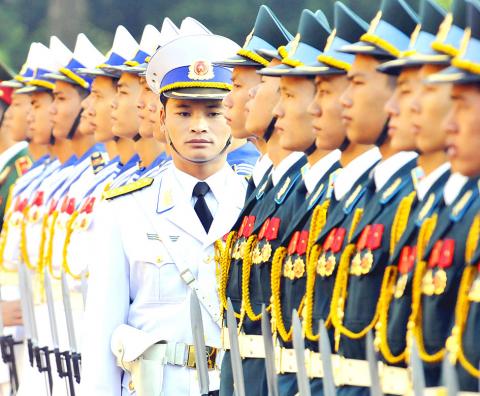Vietnam has chosen to partner Japan in mining rare earth minerals and building a nuclear power plant in the Southeast Asian country, Japanese Prime Minister Naoto Kan said yesterday, as Tokyo seeks to reduce its dependence on China.
Japan, the world’s third-biggest nuclear power generator, is also eyeing fast-growing markets to develop nuclear plants as electricity demand in the country is likely to stay flat or rise slightly due to its ageing society and industries going abroad.
“Prime Minister [Nguyen Tan] Dung told me this decision was a political and strategic one,” Kan told reporters after meeting Dung.

PHOTO: AFP
Japan has said shipments of rare earths from China were blocked during a diplomatic row sparked by the arrest of a Chinese trawlerman in disputed waters.
Japan’s stockpile of the minerals could be exhausted by March or April without fresh imports from China, officials have said.
China gave repeated assurances at an Asia-Pacific summit in Hanoi that ended on Saturday that it would remain a “reliable supplier” of the high-tech ores used in lasers, superconductors, computers and other electronics.
Nevertheless, Japan and other countries, including the US, say they want to diversify their sources of supplies.
Last week, Japan and India decided to seek cooperation in developing, recycling and finding substitutes for rare earths and rare metals.
Japan believes it has secured the mining rights for a mine in Lai Chau Province of northwestern Vietnam, another Japanese government official said.
feasibility study
Japan’s Sojitz Corp and Toyota Tsusho Corp and a Vietnamese firm are conducting a feasibility study at a deposit in Lai Chau, and the project could produce 3,000 tonnes of rare earth minerals a year or about 10 percent of annual demand in Japan, a Japanese trade ministry official said.
Tokyo is certain that Vietnam will choose out of the three Japanese nuclear plant makers to build two reactors at a nuclear power plant site in central Vietnam, a Japanese government official said.
“Vietnam confirms that the Vietnamese government chooses Japan as a cooperation partner to build two nuclear reactors”, their joint statement said.
joint venture
The three are Hitachi Ltd, allied with General Electric, Toshiba Corp, which controls US power firm Westinghouse, and Mitsubishi Heavy Industries, which has a joint venture with Areva, he said.
Kan also told Dung that Japan, Vietnam’s biggest donor, would provide about ¥79 billion (US$982.7 million) in yen loans to Vietnam for infrastructure projects, a joint statement between the two leaders showed.

US PROBE: The Information reported that the US Department of Commerce is investigating whether the firm made advanced chips for China’s Huawei Taiwan Semiconductor Manufacturing Co (TSMC, 台積電), the world’s largest contract maker of advanced chips, yesterday said it is a law-abiding company, and is committed to complying with all applicable laws and regulations including export controls. The Hsinchu-based chip giant issued the statement after US news Web site The Information ran a story saying that the US Department of Commerce has launched a probe into TSMC over whether it breached export rules by making smartphone or artificial intelligence (AI) chips for China’s Huawei Technologies Co (華為). “We maintain a robust and comprehensive export system for monitoring and ensuring compliance,” the statement said. “If we

DEMAND FOR AI CHIPS: Net income in the third quarter surged 31.2% quarter-on-quarter to NT$325.26 billion, the strongest quarterly return in the company’s history Taiwan Semiconductor Manufacturing Co (TSMC, 台積電), the world’s biggest contract chipmaker, yesterday raised its revenue forecast to annual growth of 30 percent this year, thanks to strong and sustainable demand for artificial intelligence (AI) processors for servers. It was the second upward adjustment from 25 percent year-on-year growth estimated three months ago, despite recent concerns about whether the AI boom could be another technology bubble. “The demand is real. It’s real. And I believe it is just the beginning of this demand. Alright, so one of my key customers said the demand right now is ‘insane,’” TSMC chairman and chief executive C.C.

Starbucks Corp might have the more recognizable name, but 7-Eleven’s City Cafe remains the king of Taiwan’s fresh coffee market, helped by the convenience store chain’s extensive market presence and product diversification. President Chain Store Corp (PCSC, 統一超商), which runs both the 7-Eleven and Starbucks store chains in Taiwan, established the City Cafe brand in 2004. The brand took off when actress Gwei Lun-mei (桂綸鎂) became its spokesperson in 2007. City Cafe’s sales exceeded NT$10 billion (US$311.69 million) for the first time in 2015, surpassing the revenue of Starbucks Taiwan, and rose to more than NT$17 billion last year, exceeding the NT$14.98

COUNTRY-BASED: Setting ceilings on sales of the technology would tighten limits that originally targeted China’s ambitions in artificial intelligence amid security risks US officials have discussed capping sales of advanced artificial intelligence (AI) chips from Nvidia Corp and other American companies on a country-specific basis, people familiar with the matter said, a move that would limit some nations’ AI capabilities. The new approach would set a ceiling on export licenses for some countries in the interest of national security, according to the people, who described the private discussions on condition of anonymity. Officials in the administration of US President Joe Biden focused on Persian Gulf countries that have a growing appetite for AI data centers and the deep pockets to fund them, the people